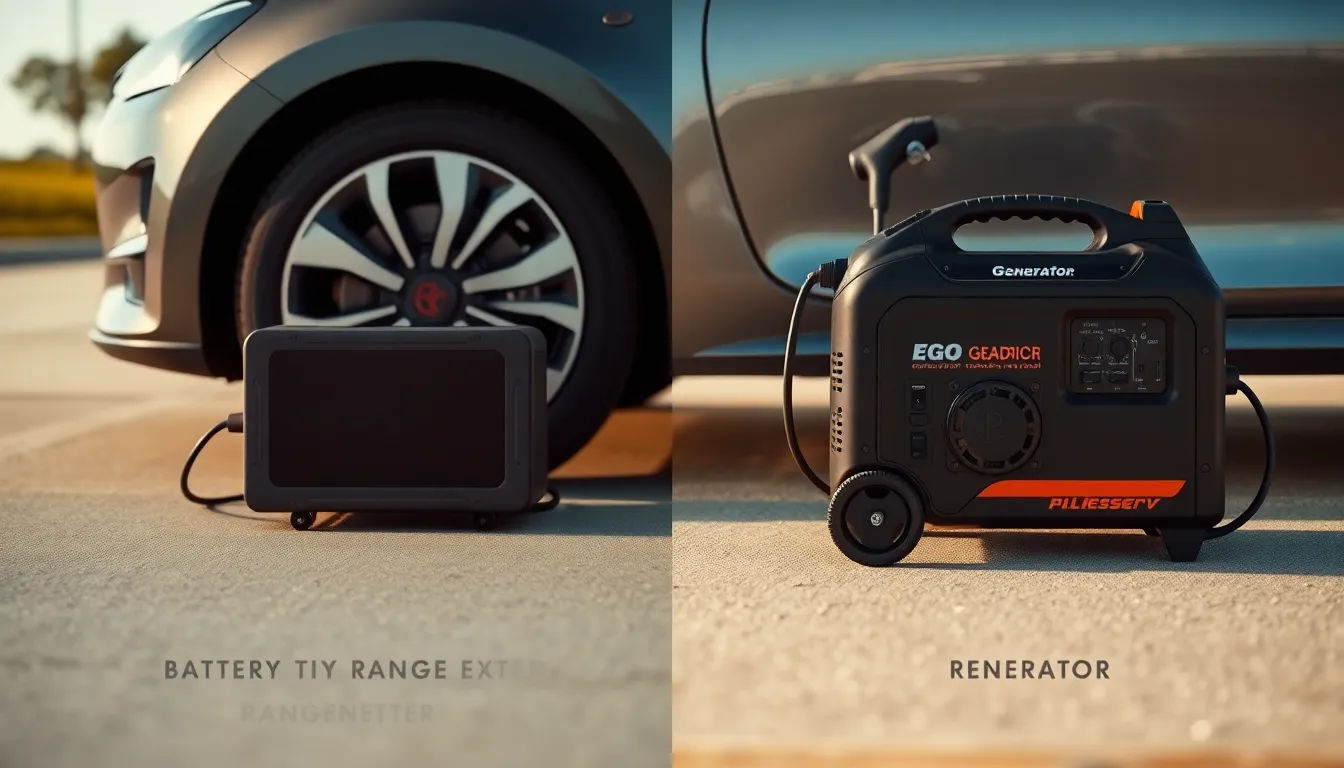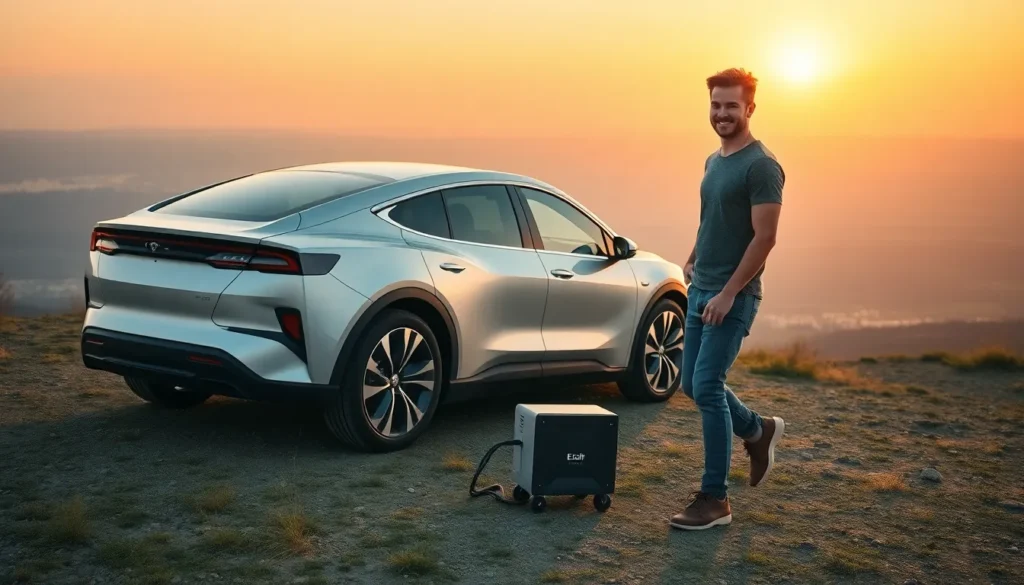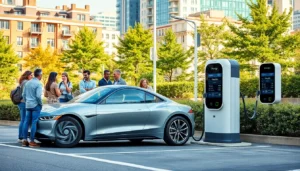Electric cars are revolutionizing the way we think about transportation, but let’s face it—range anxiety can turn even the most enthusiastic driver into a nervous wreck. Imagine cruising down the highway, wind in your hair, only to realize your battery’s running low. Cue the panic! Enter electric car range extenders, the unsung heroes of the EV world.
Table of Contents
ToggleOverview of Electric Car Range Extenders
Electric car range extenders serve to alleviate range anxiety for drivers concerned about battery depletion. These devices increase the overall driving range of electric vehicles. Typically, they consist of a small internal combustion engine that generates electricity, providing power to the vehicle’s electric motor or charging the battery directly.
Many types of range extenders exist on the market. Some systems utilize gasoline engines, while others may incorporate alternative fuel sources, such as hydrogen fuel cells. Their design allows for seamless integration within existing electric vehicle platforms.
Performance varies based on the specific characteristics of each range extender. For instance, some models can extend range by approximately 100 to 150 miles on a full tank, making long-distance travel more feasible. Common manufacturers of range extenders include established automotive brands exploring innovative technologies.
Range extenders maintain minimal emissions compared to traditional vehicles. As a result, they offer an environmentally friendly option while enhancing the practicality of electric cars. This hybrid approach appeals to those who seek to reduce their carbon footprint while enjoying extended travel capabilities.
By enabling longer trips, range extenders contribute significantly to reducing driver anxiety associated with electric vehicles. Their transformative nature ensures that electric vehicle owners can enjoy the benefits of sustainable driving without the fear of running out of charge unexpectedly. Implementing range extenders fosters a positive driving experience, thereby encouraging wider adoption of electric vehicles.
Types of Range Extenders

Range extenders come in various types, each designed to enhance the driving range of electric vehicles effectively.
Battery Range Extenders
Battery range extenders use additional battery packs to increase the total power supply. These systems integrate seamlessly with the existing electric drivetrain. Increased battery capacity allows for greater distance traveled before needing to recharge. They serve a practical function for drivers seeking peace of mind during longer trips. For example, some supplementary battery setups can boost range by 50 to 100 miles, providing significant flexibility.
Generator Range Extenders
Generator range extenders utilize small internal combustion engines to produce electricity on-demand. These generators can run on gasoline or alternative fuels, offering versatility. When required, they kick in to charge the battery while the vehicle operates. Emissions from these generators remain lower than traditional vehicles, maintaining environmental standards. For instance, a generator can extend the driving range by approximately 100 to 150 miles, reducing range anxiety for users.
Benefits of Using Range Extenders
Range extenders offer significant advantages for electric vehicle users, addressing concerns related to driving distance and flexibility.
Increased Driving Range
Range extenders effectively increase the driving range of electric vehicles. They allow drivers to travel an additional 100 to 150 miles on a single tank of fuel. This technology alleviates range anxiety, making long trips more feasible. For instance, drivers no longer need to plan around charging stations on every journey. Manufacturers design these extenders to integrate seamlessly into existing electric vehicle platforms, enhancing usability. With this additional range, electric vehicle adoption rises as more drivers experience the benefits firsthand.
Enhanced Flexibility
Flexibility becomes a key benefit when utilizing range extenders in electric vehicles. They enable drivers to embark on spontaneous trips without the fear of running out of battery. Range extenders accommodate various fuel types, such as gasoline or hydrogen, providing options for different driving needs. Drivers can adapt their travel plans based on personal preferences and locations of charging stations. Additionally, this flexibility contributes to a more satisfying driving experience, encouraging the use of electric vehicles in various scenarios. Enhanced flexibility promotes practicality, making electric vehicles a more viable option for diverse lifestyles.
Challenges and Considerations
Range extenders present various challenges that users need to consider. Understanding these challenges helps in making informed decisions regarding their use.
Cost Implications
Cost represents a significant consideration for potential range extender users. Initial investments vary widely based on the type and technology of the range extender, with prices ranging from $1,500 to $5,000. Maintenance costs can also accrue, as they require periodic checks and servicing. Fuel expenditures might increase if gasoline or alternative fuels are used frequently. Evaluating overall expenses proves essential to determine the financial feasibility of incorporating range extenders.
Weight and Space Limitations
Weight and space constraints affect the practicality of range extenders. Including them in an electric vehicle can add between 100 to 300 pounds, impacting the vehicle’s efficiency. Vehicle design may restrict available space for installations, particularly in compact models. Balancing the benefits of increased range with the potential downsides of added weight is crucial. Manufacturers often strive to minimize these limitations while maintaining effective performance, yet trade-offs may still exist.
Future of Electric Car Range Extenders
Innovations in electric car range extenders are on the rise, reflecting a growing focus on expanding EV capabilities. Emerging trends point to improved technologies that enhance energy efficiency and reduce emissions. Manufacturers are developing lighter, more compact range extenders, which can boost driving ranges without increasing vehicle weight significantly.
Advancements in battery technology are pivotal as well. Solid-state batteries are gaining traction, offering higher energy densities and shorter charging times. The incorporation of these batteries can complement range extenders, creating a hybrid system that maximizes range while minimizing downtime.
Hydrogen fuel cell technology is expected to play a larger role in the future of range extenders. These systems can produce electricity through a chemical reaction, offering another avenue for increasing vehicle range. Not only do hydrogen fuel cells present a green alternative, but they could also lead to reductions in refueling times compared to traditional gas engines.
Consumer demand for sustainable alternatives drives innovation. As more drivers adopt electric vehicles, expectations for longer ranges and faster refueling options will likely increase. Market competition fosters rapid tech advancements, pushing automotive manufacturers to optimize their offerings in range extenders.
Regulatory policies also influence future developments. Governments are implementing stricter emissions standards, incentivizing the adoption of cleaner technologies. This regulatory environment creates opportunities for range extenders to thrive, as they align with goals of reducing carbon footprints while maintaining practicality for users.
Future electric vehicle models may include integrated range extenders, designed specifically for seamless performance. By harnessing hybrid systems, manufacturers can provide a more cohesive driving experience. Addressing range anxiety effectively could play a crucial role in the widespread acceptance and growth of electric vehicles in the coming years.
Conclusion
Electric car range extenders represent a significant advancement in addressing range anxiety for electric vehicle drivers. By offering additional miles through innovative technology, these devices enhance the practicality of electric cars while maintaining a focus on environmental sustainability. As the industry evolves, the integration of lighter and more efficient range extenders will likely become standard in future electric vehicles.
The ongoing development of battery technology and hydrogen fuel cells promises to further improve the driving experience. With growing consumer demand for sustainable transportation options and supportive regulatory frameworks, it’s clear that electric car range extenders will play a crucial role in the future of mobility. This evolution not only encourages wider adoption of electric vehicles but also paves the way for a greener transportation landscape.










